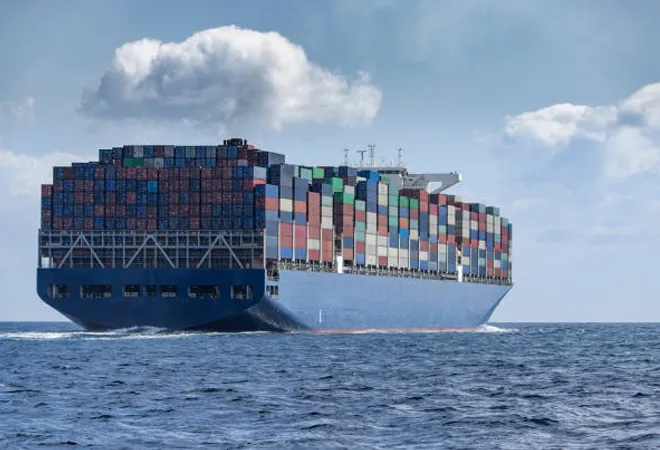-
CENTRES
Progammes & Centres
Location
Given the COVID-19 pandemic and the ongoing monkeypox epidemic, concerns over global policy hesitancy need to be addressed.

In response to crucial shortages and breakdown of critical supply chains in combating the COVID-19 pandemic, South Africa and India proposed a waiver of certain provisions of the Trade-Related Intellectual Property Rights (TRIPS) agreement on October 2020 to the TRIPS Council at the World Trade Organization (WTO) to diversify the manufacturing of supplies. The proposal seeking waiver of Intellectual Property Rights (IPR) about vaccines, therapeutics, and diagnostics, to prevent, contain, and treat COVID-19, received the support of over a hundred countries and civil societies. However, the European Union (EU), Switzerland, Finland, and several other developed nations opposed the waiver, arguing that the existing TRIPS agreement is equipped with adequate flexibilities and tools to allow eligible countries to manufacture the vaccine using compulsory licensing. Despite the flexibility, there were reports of IPRs continuing to be an obstacle during an emergency. As developing nations have attracted controversy and continue to impose trade sanctions whilst attempting to take advantage of TRIPS flexibilities, India continues to negotiate for extending the provisions of the TRIPS waiver to include therapeutics, diagnostics, and tools.
Incessant prevarication ensued as a result of weak agenda setting, as members were divided through efforts to safeguard incompatible interests, and conflicting interpretations of the terms of the proposed waiver, wearing down the opportunities for policy action to improve equitable access to essential medical resources.
During these 20 months of deliberation on the TRIPS waiver, there were numerous occasions or summits where the subject of vaccine equity was addressed, and alternatives were considered, but consensus and cooperation on the waiver remained elusive. Incessant prevarication ensued as a result of weak agenda setting, as members were divided through efforts to safeguard incompatible interests, and conflicting interpretations of the terms of the proposed waiver, wearing down the opportunities for policy action to improve equitable access to essential medical resources. Even as the pandemic disproportionately impacted the health and livelihoods of low-income countries (LICs), proportional policy action to ensure access to lifesaving resources was not realised. The term “policy hesitancy” can be used to describe the hesitancy of policymakers to consolidate appropriate and adequate policy action for providing access to tools and resources that could help affected communities. This paper attempts to provide an overview of policy hesitancy using two models, i.e. Kingdon's and Diderichsen’s. We also illustrate policy hesitancy amongst global leadership through sentiment analysis on statements from member states and further discuss the key events, actions, and decisions that transpired since the waiver was first proposed.
Kingdon's streams model suggests that the alignment of the problem, and political and policy streams leads to an open window of opportunity for policy enactment. The timely utilisation of the terms of the TRIPS waiver should have been a tool to prevent two-tier global recovery where developed and developing nations, with intentional efforts for global solidarity against the pandemic, could have shared technology and know-how as well as removed barriers to lifesaving resources. Instead, the adoption of nationalist policies, stockpiling of vaccines, lack of transparency and accountability regarding vaccine contracts, and continued withholding of vaccine technology and resources exacerbated the issue of inequity (Figure 1). The agenda status of the TRIPS waiver could not overcome the political consideration regarding the future of IPR, and the opportunity for policy consensus was mislaid.
Figure 1:Adaption of Kingdon's stream model
The hesitancy to enact a policy that promotes equity, and synergy, and is consistent with the terms of the Doha Declaration, highlights the difficulties in policy practice at the bilateral level when utilising licensing provisions not only for COVID-19 but also for future threats like the monkeypox epidemic. According to Article 66.2 of the TRIPS agreement, industrialised countries are expected to contribute to the transfer of technology and expertise to least developed countries (LDCs) to promote human welfare and a balance of rights and obligations. These provisions have proven difficult to enforce as they are broadly worded, and IPRs are considered private rights, therefore, the technology gap remains gaping, as evidenced by the near total dependence of many LDCs on pharmaceutical imports.
The 12th Ministerial Conference (MC) of the World Trade Organisation (WTO) took place on 12 June 2022 under the expectation of multilateralism and statements of support from the member nations toward WTO as a system for world trade and global economic development. To understand the perspectives of WTO members, we used Valence Aware Dictionary for Sentiment Reasoning (VADER) model for examining their sentiment toward the TRIPS waiver based on statements from member nations before the MC.
According to Article 66.2 of the TRIPS agreement, industrialised countries are expected to contribute to the transfer of technology and expertise to least developed countries (LDCs) to promote human welfare and a balance of rights and obligations.
Australia, Indonesia, Kenya, and over 100 countries called for vaccine equity through a waiver of certain aspects of the TRIPS agreement, whilst EU, Germany, Norway, and over 20 industrial nations were still weighing concerns regarding the integrity of IPR and incentivisation of innovation. Bahrain, Israel, and Singapore are among the nations that have withheld comment on the waiver in statements released before the Ministerial conference, whilst Albania, Romania, and several others remain neutral regarding the waiver, admitting the need for measures to increase vaccine equity whilst remaining reserved regarding the temporary waiver.
The EU, South Africa, India, and the US used a problem-solving approach in their deliberations, to suggest practical measures to explain, streamline, and simplify how governments can override patent rights under certain scenarios to facilitate manufacturing diversification for medical supplies. Agenda setting could not be established due to opposing nations’ policy hesitancy over allowing waiver mechanisms to include therapeutics and diagnostics. Global policy hesitancy led to objection to the revised TRIPS waiver and prolonged and hard deliberation, culminating in the dilution of policy solutions by restricting the diversified production and supply of COVID-19 diagnostics and therapeutics. The policy hesitancy surrounding the need for the waiver prevented the realisation of the goal to “build back better” and due to lack of consensus, the TRIPS waiver, as intended, was not achieved during WTO MC on June 2022, instead a watered-down waiver allowing compulsory licensing for COVID-19 vaccines was attained. Whilst a few responded with cautious optimism to the compromised TRIPS waiver, accepting it as a first step towards ensuring equitable distribution of resources against COVID-19, others fear that the partial waiver will fail to address policy barriers to unrestricted and prompt access to affordable tools, therapeutics and diagnostics necessary for global recovery from the pandemic.
The policy hesitancy surrounding the need for the waiver prevented the realisation of the goal to “build back better” and due to lack of consensus, the TRIPS waiver, as intended, was not achieved during WTO MC on June 2022, instead a watered-down waiver allowing compulsory licensing for COVID-19 vaccines was attained.
Achieving vaccine equity requires the implementation of policy action through clear agenda setting in appreciation of global solidarity against developing issues. The Diderichsen model shows the mechanism of health inequality such as social positions that stratify the population into groups experiencing differential exposure and differential vulnerability, especially in the context of existing capacity and limited resource availability. As illustrated by the Diderichsen model, the policy must also incorporate the consequences of social stratification, differential impact, and disproportionate outcome of illness in low and middle-income countries (LMICs) compared to high-income countries (HICs) (Figure 2). The missed window of opportunity in the context of COVID-19 caused the virus to remain in circulation amongst the non-immunised population leading to a lethal second wave of mutated versions such as the Delta and Omicron.
Figure 2: Adaption of Diderichsen Model
Currently, India is continuing to renegotiate for extending the flexibilities in the TRIPS waiver to include diagnostics, tools, and therapeutics. With the disproportionate emphasis on the compulsory licensing mechanism as adopted during WTO meetings, the current text continues to be limited to allow access to lifesaving resources. The TRIPS agreement was once again on the agenda as India met with other nations including the UK. In the latest Free Trade Agreement, the UK renewed its commitment to the Doha Declaration on TRIPS and Public Health and has come out in support of improving access to medicines, particularly during a Public Health Emergency of International Concern (PHEIC). Even as negotiation for further extension of TRIPS waiver for COVID-19 continues, another public health threat, monkeypox, is receiving little to no response to challenges it presents to African nations. Despite being endemic in Africa, the continent is yet to receive any vaccines against this threat. Around 16 million doses of these vaccines continue to be stockpiled by the same nations that opposed the TRIPS waiver for COVID-19.
The views expressed above belong to the author(s). ORF research and analyses now available on Telegram! Click here to access our curated content — blogs, longforms and interviews.

Cauvery K is a Research Fellow Applied Data Science at PSPH with over six years of experience working as Mac OS Application Developer for Software ...
Read More +
Mrs. Jestina Rachel Kurian is a research scholar at Prasanna School of Public Health pursuing her Ph.D. in data science related to biomedicine. She has ...
Read More +
Miss. Viola Savy Dsouza is a PhD Scholar at Department of Health Policy Prasanna School of Public Health. She holds a Master of Science degree ...
Read More +
Dr. Sanjay M Pattanshetty is Head of theDepartment of Global Health Governance Prasanna School of Public Health Manipal Academy of Higher Education (MAHE) Manipal Karnataka ...
Read More +
Prof. Dr.Helmut Brand is the founding director of Prasanna School of Public Health Manipal Academy of Higher Education (MAHE) Manipal Karnataka India. He is alsoJean ...
Read More +